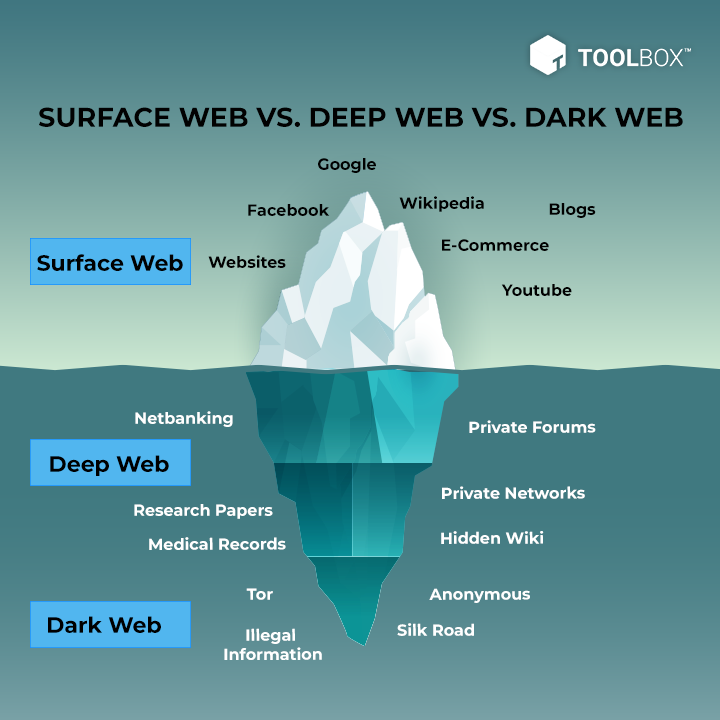
THE DARK WEB

The Onion Router - TOR
What is the Dark Web? Well, The Onion Router (TOR), is a browser that allows people to keep their privacy while online. There are different layers of the internet, and they are as follows:
Surface Web:
This is the portion of the internet that users are most familiar with. It includes websites that are indexed by search engines and can be easily accessed using standard web browsers. Examples include popular websites like social media platforms, news sites, and e-commerce portals.
Deep Web:
This layer is much larger than the Surface Web and contains a vast amount of information not indexed by search engines. It includes content that is behind paywalls, password-protected areas, and private databases. Accessing the Deep Web typically requires specific credentials or permissions.
Dark Web:
Also known as the Darknet, this is a subset of the Deep Web that requires special software, like Tor, to access. It is characterized by its anonymity and is often associated with illegal activities, though it also provides a space for legitimate uses like journalism in conflict zones.
How does The Onion Router work?
The Tor Browser works by using onion routing, a system that encrypts and routes internet traffic through a series of volunteer-run servers called relays, making it harder to trace where the traffic originated or its destination. This process provides a level of anonymity and privacy for users browsing the web.
Onion Routing - Tor employs a multi-layered encryption system where your traffic is encrypted and routed through at least three different relays (servers) before reaching its destination.
Relays - These relays are nodes in the Tor network that are run by volunteers around the world.
Encryption - Each relay "peels" away a layer of encryption from your traffic as it passes through, hiding the previous relay's IP address and your own IP address.
Anonymity - This process makes it difficult for anyone, including your internet service provider, to see where your traffic is going and who is sending it.
Hidden Services - The Tor network also supports hidden services (websites with addresses ending in ".onion") that are only accessible through the Tor network, further enhancing privacy.
But is the dark web safe? Can you truly remain anonymous online?
The dark web presents several risks, including the potential for malware infection, scams, data theft, and exposure to illegal content. Users can be targeted by cybercriminals who distribute malicious software, engage in phishing attacks, or trade stolen information. Additionally, law enforcement agencies may monitor dark web activities, potentially identifying users involved in illegal activities.
You must never log into any personal accounts while on browsing TOR. The purpose is keeping your privacy and due to the risks of exposure, privacy would go right out the window by checking your bank account or your personal email account. Other risks that lurk on the dark web are listed below:
IP exposure - VPN’s are not always reliable depending on the VPN service provider. If you are browsing certain onion domains, you could risk having your IP address exposed when visiting that site. This could happen due to a connectivity issue with your VPN service provider.
Scams and Fraud - Conducting purchases via the TOR browser also poses a risk. Dark web sites often engage in scams and fraudulent activities, promising goods or services that don't exist or trick users into revealing sensitive information.
Data Theft - Data theft is another risk that exists. Stolen personal information, including credit card details and social security numbers, is often traded on the dark web.
Illegal Content and Activities - The dark web hosts a wide range of illegal content, including child pornography, drugs, weapons, and stolen data. Users can face legal repercussions for accessing or participating in such activities.
Surveillance and Monitoring - While the dark web offers anonymity, law enforcement agencies and intelligence services may monitor its activities.
Device Infection - Downloading files or visiting compromised sites can infect your device with malware, ransomware, or other malicious software.
Legal Consequences - Engaging in illegal activities on the dark web can lead to arrest and prosecution, even if the user was unaware of the illegality.
Psychological Harm - Exposure to disturbing or illegal content can cause psychological distress.
Staying safe while browsing the dark web is essential. Some tips on staying safe are as follows:
1. Never log into your person accounts. This includes bank accounts, social media, email, etc.
2. If you use a VPN, use a reliable one. Free VPN services usually have issues masking your IP address.
3. Do not engage in any illegal activities or visit any sites that may contain illegal content.
4. Change the browser settings to read only. That way when visiting sites, you minimize the risks of possible malware attacks that may be injected into the sites code.
5. If you do conduct any money/digital transactions, ensure that it is legitimate. You can also use virtual cards that are for one time use to prevent your real card information from being stolen.
If you want to learn more or just explore, you can click on the tabs below. Both tabs will take you to the TOR project website. One will take you to the download page to download the TOR browser and the other tab will take you to “About” section of the TOR project website. Stay safe and proceed at your own risk.

